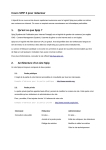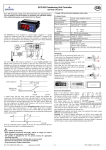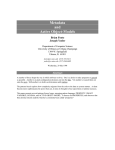Download C++ Programming Standards
Transcript
EUROPEAN
SOUTHERN
OBSERVATORY
Organisation Européenne pour des Recherches Astronomiques dans l’Hémisphère Austral
Europäische Organisation für astronomische Forschung in der südlichen Hemisphäre
VERY LARGE TELESCOPE
VLT Data Flow System
C++ Programming Standards
Doc.No. VLT-PRO-ESO-19000-1208
Issue 1.0
Date 13/07/99
C. Guirao, N. Kornweibel
Prepared ..................................................................................................
Name
Date
Signature
M. Peron
Approved ..................................................................................................
Name
Date
Signature
P. Quinn
Released ..................................................................................................
Name
Date
Signature
VLT PROGRAMME * TELEPHONE: +49 89 32006-0 * FAX: +49 89 320 2362
2
C++ Programming Standards
VLT-PRO-ESO-19000-1208
Issue: 1.0 Date: 13/07/99
C++ Programming Standards
VLT-PRO-ESO-19000-1208
Issue: 1.0 Date: 13/07/99
Change Record
Issue/Rev.
Date
Section/Page affected
Reason/Initiation/Document/Remarks
0.9
26/08/96
All
Preliminary Draft
1.0
13/07/99
Added to amendments
section.
Update to final release.
3
4
C++ Programming Standards
VLT-PRO-ESO-19000-1208
Issue: 1.0 Date: 13/07/99
C++ Programming Standards
VLT-PRO-ESO-19000-1208
Issue: 1.0 Date: 13/07/99
5
TABLE OF CONTENTS
1 Introduction
1.1
1.2
1.3
7
Purpose . . . . . . . . . . . . . . . . . . . . . . . . . . . . . . . . . . . . . . . . . . . . . . . . . . . . . . . . . . . . . . . . . . . . . . 7
Scope . . . . . . . . . . . . . . . . . . . . . . . . . . . . . . . . . . . . . . . . . . . . . . . . . . . . . . . . . . . . . . . . . . . . . . . . 7
Reference Documents . . . . . . . . . . . . . . . . . . . . . . . . . . . . . . . . . . . . . . . . . . . . . . . . . . . . . . . . . . 7
2 Amendments to the Ellemtel document
9
3 Summary of rules (with Amendments)
11
4 Software Documentation
15
5 Templates
17
5.1
5.2
Template for header files . . . . . . . . . . . . . . . . . . . . . . . . . . . . . . . . . . . . . . . . . . . . . . . . . . . . . . 17
Template for implementation files . . . . . . . . . . . . . . . . . . . . . . . . . . . . . . . . . . . . . . . . . . . . . . 19
6
C++ Programming Standards
VLT-PRO-ESO-19000-1208
Issue: 1.0 Date: 13/07/99
C++ Programming Standards
1
1.1
VLT-PRO-ESO-19000-1208
Issue: 1.0 Date: 13/07/99
7
Introduction
Purpose
The purpose of the C++ Programming Standards document is to provide a common framework for
the implementation phase of the VLT Data-Flow Project.
The Data Pipeline Group in his Data Flow Design Meeting from 18/04/96 took the decision to use
the document Programming in C++, Rules and Recommendations from Ellemtel as the baseline for C++
programming in the implementation of the VLT Data-Flow System. The Ellemtel document is one
of the most accepted coding standard guidelines for C++ programming.
Based on that decision a forum of discussion called coding-std was created with representatives of
the DMD and VLT divisions and aimed to harmonize with the existing VLT software standards and
to agree on amendments to the original Ellement document to better fulfill the needs of the DataFlow project in terms of C++ Coding Standards. This document is the resume of that discussion,
thus acknowledgments are therefore due to all who have contributed to this discussion.
The original Ellemtel document (copies should be available to all programmers) plus these amendments conform the C++ Programming Standards for the VLT Data Flow System and it should became a
reference or a chapter of the Quality Assurance Plan Document for the VLT Data Flow System.
Included in this document is also the Software Documentation for the VLT Data Flow System. It includes the selected Documentation System doc++ and templates for source and header files.
1.2
Scope
This framework is aimed, first of all, to write maintainable C++ code: consistent style within the
project life cycle, easy to understand and as clear and simple as practicality allows. Second; to improve reliability: free of common bugs, resistance to the introduction of bugs and easy to test. Third,
to improve portability to other architectures.
Software Documentation might not be considered part of Coding Standards, but they provide he
common layout for files and format documentation that must be used in all C++ files of the project.
Design, construction, validation or verification, although very important keys in the development
of a project, are beyond the scope of this document.
Coding Standards and template files are not perfect and therefore it is intended to be dynamic and
should be improve over time.
1.3
Reference Documents
[1] Programming in C++ Rules & Regulation. Mats Henricson and Erik Nyquist (Ellemtel Telecommunication Systems Laboratories)
[2] Programming in C++. Dave Charles, dated 13/11/95 (Delcam International plc.)
[3] C++ Documentation System- Requirements. VLT Data Flow. (http://www.eso.org/dataflow/
docs/doc_req/doc_req.html, dated 25/6/96)
[4] VLT Programming Standards
VLT-PRO-ESO-10000-0228
8
C++ Programming Standards
VLT-PRO-ESO-19000-1208
Issue: 1.0 Date: 13/07/99
[5] DOC++, a Documentation System for C++, rel 2.0 (http://www.ZIB-Berlin.DE/VisPar/doc++/
doc++.html)
C++ Programming Standards
2
VLT-PRO-ESO-19000-1208
Issue: 1.0 Date: 13/07/99
9
Amendments to the Ellemtel document
• Rule 1: Include files in C++ always have the file name extension “.h”.
• Rule 2: Implementation files in C++ always have the file name extension “.C”.
• Rec. 4: *** Removed ***
• Exception to Rule 1: Include files with extension “.hh” from external libraries required by
the project.
• Exception to Rule 2: No exceptions.
• Rec. 7: Any include and implementation file should have a file name of the form
<prefix><class name>+extension. Use uppercase and lowercase letters in the same way as in
the source code. If the implementation file is split into different files the name of each new file
will be the old one followed by an underscore followed by a lower case word. For example, if
a file ZzzClass contains member function ZzzClass::member() which is to be implemented in
a a file of its own, the file might be called ZzzClass_member.
• Rule 10: Never specify relative UNIX names in #include directives, except when using include
files from POSIX, X11 and Motif and other third party libraries.
• Rule 12: The identifier of every globally visible class, enumeration type, type definition,
function, constant, and variable in a class library is to begin with a prefix that is unique for the
library. Prefixes are to be in lower case and with a length from two to six characters.Rule 12:
The identifier of every globally visible class, enumeration type, type definition, function,
constant, and variable in a class library is to begin with a prefix that is unique for the library.
Prefixes are to be in lower case and with a length from two to six characters.
• Rule 14: The names of classes, structures are to begin with an uppercase letter. Macros,
typedefs and enumerated types only use uppercase letter and if two or more words are needed
use the underscore as the separator.
Rec. 10: Use the directive #include “filename.h” for user-prepared include file.
Remark: Be aware of directives #include “filename.h”. You may wrongly believe that this
directive force the compiler to search first in the current directory of your source file, when it
searches first in the directory where the current input came from.
• Rec. 11: Use the directive #include <filename.h> for include files from libraries.
• Rule. 12b: Use the prefixes get and set for methods to access private data.
Example:
class ZzzMyClass
{
public:
String getName() const;
recode setName(const String& aname);
private:
String name;
};
• Rec. 28: Do not use tabs for code indentation and keep lines within 79 characters long. Use the
code style shown in the examples of the Ellemtel document.
• Rec. 35: Use operator overloading sparingly and in a uniform manner. One may want to limit
the set of operators which may be overloaded. In any case, if overloading is used it must be
clearly noted in the documentation.
• Rule 30a: Do not use inheritance for parts-of-relations.
10
C++ Programming Standards
VLT-PRO-ESO-19000-1208
Issue: 1.0 Date: 13/07/99
• Rec. 37: Avoid multiple inheritance in general or use composition instead.
• Rec. 41: Avoid functions with many arguments and never more than 7.
• Rec. 46: Minimize the number of temporary objects that are created as return values from
functions or as arguments to functions. This is helped by using the prefix operations rather
than the postfix ones, E.g. use ++i, rather than i++.
• Rule 38: Variables are to be declared with the smallest possible scope except for loops where
variables can be declared just before the block of the loop.
• Exception to Rule 43: In addition to the Ellemtel text:
a. Address casting away const. Use it where the implementors view of the const-ness of a
variable differs from that of the user.
Example:
class C {
public:
C():m_ember(0) {}
~C(){}
void foo() const
{
((C*)this)->m_ember = 15;
}
protected:
int m_ember;
};
An application would not consider foo() to change the (abstract) state of C, yet,
internally. it does. In order for foo() to be a const function, you need to use casting.
b. Object casting to force one of a number of ambiguous implicit conversions. (Basically, to
help the compiler out.)
c. Address-casting to a derived class. (`downcasting’). If this is done, the base class ought
to know which of its derived types it is part of. An assertion that the base class is
really part of the appropriate derived class should be used.
d. .Casting in and out of a generic object (eg. void*). (This might not be necessary if
templates or STL containers can be used)
• Rec. 59: Always assign an invalid value (e.g. 0xDEADF00D) to a pointer that points to
deallocated memory. Use utility class utCheckValid for a stronger control for deallocated
objects (see Appendix A).
The theory says that it is better to have a process crash, than to spread erroneous information,
so assigning an invalid address (but not 0) to a pointer of a deallocated memory it forces the
process to crash (however this is not true with all systems/compilers, at least no with SunOS/
g++).
• Rec. 60: Use exceptions to implement fault handling. An overloaded copy of operator “new”
would be used to rise un exception for a “not enough memory” condition.
C++ Programming Standards
3
VLT-PRO-ESO-19000-1208
Issue: 1.0 Date: 13/07/99
11
Summary of rules (with Amendments)
The following list is a summary of the C++ Coding standard Rules as appearing in the Ellemtel document, adjusted for the agreed amendments. Please note that the Summary of Recommendations
provided in the Ellemtel document is also a vital element of the C++ Coding Standards.
Summary of Rules
Rule
Rule 0
Every time a rule is broken, this must be clearly documented.
Rule 1
Include files in C++ always have the file name extension “.h”
Rule 2
Implementation files in C++ always have the file name extension “.C”.
Rule 3
Inline definition files always have the file name extension “.icc”.
Rule 4
Every file that contains source code must be documented with and introductory
comment that provides information on the file name and its contents.
Rule 5
All files must include copyright information.
Rule 6
All comments are to be written in English.
Rule 7
Every include file must contain a mechanism that prevents multiple inclusion of
the file.
Rule 8
When the following kinds of definitions are used (in implementation files or in
other include files), they must ne included in separate include files:
• classes that are used as base classes,
• classes that are used as member variables,
• classes that appear as return types or as argument types in function/
member function prototypes.
• function prototypes for functions/member functions used in inline
member functions that are defined in the file.
Rule 9
Definitions of classes that are only accessed via pointers (*) or reference (&) shall
not be included as include files.
Rule 10
Never specify relative UNIX names in #include directives, except when using
include files from POSIX, X11, Motif and other third party libraries.
12
C++ Programming Standards
VLT-PRO-ESO-19000-1208
Issue: 1.0 Date: 13/07/99
Summary of Rules
Rule
Rule 11
Every implementation file is to include the relevant files that contain:
• declarations of types and functions used in the functions that are
implemented in the file.
• declarations of variables and member functions used in the functions
that are implemented in the file.
Rule 12
The identifier of every globally visible class, enumeration type, type definition,
function, constant and variable is the begin with a prefix that is unique for the
library. Prefixes are to be lowercase and with a length of two to six characters.
Rule 13
The names of variables, constants and functions are to begin with a lowercase letter.
Rule 14
The names of abstract data types, structures, typedefs and enumerated types are to
begin with an uppercase letter. Macros, typedefs and enumerated types use only
uppercase letters, multiple words are to be separated with underscores (‘_’).
Rule 15
In names which consist of more that one word, the words are to be written together
and each word that follows the first is to begin with an uppercase letter.
Rule 16
Do not use identifiers which begin with one or two underscores (‘_’ or ‘__’).
Rule 17
A names that begins with an uppercase letter is to appear directly after its prefix.
Rule 18
A name that begins with a lowercase letter is to be separated from its prefix using
an underscore (‘_’).
Rule 19
A name is to be separated from its suffix using an underscore (’_’).
Rule 20
The public, protected and private sections of a class are to be declared in that
order.
Rule 21
No member functions are to be defined within the class definition.
Rule 22
Never specify public or protected member data in a class.
Rule 23
A member function that does not affect the state of an object (its instance variables) is to be declared const.
C++ Programming Standards
VLT-PRO-ESO-19000-1208
Issue: 1.0 Date: 13/07/99
Summary of Rules
Rule
Rule 24
If the behaviour of an object is dependent on the data outside the object, this data
is not to be modified by const member functions.
Rule 25
A class which uses “new” to allocate instances managed by the class, must define a
copy constructor.
Rule 26
All classes which are used as base classes and which have virtual functions, must
define a virtual destructor.
Rule 27
A class which uses “new” to allocate instances managed by the class, must define
an assignment operator.
Rule 28
An assignment operator which performs a destructive action must be protected
from performing this action on the object upon which it is operating.
Rule 29
A public member function must never return a non-const reference or pointer to
member data.
Rule 30
A public member function must never return a non-const reference or pointer to
data outside and object, unless the object shares the data with other objects. Do not
use inheritance for parts-of-relations.
Rule 31
Do not use unspecified function arguments (ellipsis notation).
Rule 32
The names of formal arguments to functions are to be specified and are to be the
same both in the function declaration and in the function definition.
Rule 33
Always specify the return type of a function explicitly.
Rule 34
A public function must never return a reference or a pointer to a local variable.
Rule 35
Do not use the preprocessor directive #define to obtain more efficient code: use
inline functions instead.
Rule 36
Constants are to be defined using const or enum: never use #define.
Rule 37
Avoid the use of numeric values in code: use symbolic values instead.
13
14
C++ Programming Standards
VLT-PRO-ESO-19000-1208
Issue: 1.0 Date: 13/07/99
Summary of Rules
Rule
Rule 38
Variables are to be declared in the smallest possible scope. Loops are an exception
to this rule.
Rule 39
Each variable is to be declared in a separate declaration statement.
Rule 40
Every variable that is declared is to be given a value before use.
Rule 41
If possible, always use initialization instead of assignment.
Rule 42
Do not compare a pointer to NULL or assign NULL, use 0 instead.
Rule 43
Never use explicit type conversions (casts).
Rule 44
Do not write code which depends on functions which use implicit type conversions.
Rule 45
Never convert pointers to objects of a derived class to pointers of a virtual base
class.
Rule 46
Never convert a const to a non-const.
Rule 47
The code following a case label must always be terminated by a break statement.
Rule 48
A switch statement must always contain a default branch which handles unexpected cases.
Rule 49
Never use goto.
Rule 50
Do not use malloc, realloc or free.
Rule 51
Always provide empty brackets (“[]”) for delete when deallocating arrays.
C++ Programming Standards
4
VLT-PRO-ESO-19000-1208
Issue: 1.0 Date: 13/07/99
15
Software Documentation
A C++ Documentation System is defined as a tool to automate documentation generation of C++
programs.
The Documentation System selected for the Software Documentation for the VLT Data Flow System was doc++. This tool fulfills the requirements specified for the VLT Data Flow System [3].
Doc++ requires some conventions in the source file, like /// to mark the next identifier, and /**
...*/ to extract text. Doc++ also uses LaTex command convention to format the text and allows references to other documentation.
Only header files .h are required to be documented to generate a complete User Manual of the class.
The implementation file .C keeps only documentation for maintenance and for the description of
implementation details, and only using standard C++ comments //... and /*...*/.
Documentation files (HTMLE and LaTex) generated with doc++ are kept under the directory doc
in each subsystem . Generation of documentation file is under the make support provided by
SNIFF+.
Documentation is generated per library, as a collection of classes. Three files are also used to support the generation of documentation:
• document.doc++ References to the header files of this library
• banner.doc++ Banner for HTML documentation
• docxx.sty Banner for LaTex documentation
Banner.doc++ and docxx.sty needs only modifications to indicate the subsystem name (e.g. VLT-DFS
Subsystem Core - User Manual 1.1) and the document code (e.g. VLT-MAN-ESO-19000-0001)
Document.doc++ is the master page for the command doc++. It contains the list of the include.h files
from which documentation will be generated. Optionally you may write an introduction section
with a general description of your subsystem.
Detailed description for each of these files can be found in the template files available in the
~dfadmin/etc directory.
16
C++ Programming Standards
VLT-PRO-ESO-19000-1208
Issue: 1.0 Date: 13/07/99
C++ Programming Standards
5
5.1
VLT-PRO-ESO-19000-1208
Issue: 1.0 Date: 13/07/99
17
Templates
Template for header files
The file template.h can be used as template for header files and can be found in ~dfadmin/etc directory.
//+++++++++++++++++++++++++++++++++++++++++++++++++++++++++++++++++++++++++++++
//COPYRIGHT (c) 1996 European Southern Observatory
//LICENSE
//
//PROJECT:
VLT Data Flow System
//AUTHOR:
Carlos Guirao - ESO/DMD/DPG
//SUBSYSTEM: Core
//
//$Revision$
//$Log$
//
//----------------------------------------------------------------------------//C============================================================================
//C INTRODUCTION:
//C
Class header file illustrating recommended document style for a class.
//C
Comments beginning with //C are annotations, they are not part of the
//C
recommended template!
//C
//C
Mark all identifiers (classes, methods, attributes, macros, etc..) to be
//C
included in the documentation with an extra “///” line BEFORE the
//C
definition of the identifier.
//C
The command ‘docify’ does exactly this! Usage: docify [infile [outfile]].
//C
//C
Optionally you use “/** <long description> */” AFTER the definition of
//C
the identifier for an extended description.
//C
//C
Only public and protected areas are included in the documentation
//C
(unless you use option -p with the command doc++ to include also
//C
private members). Standard comments may still be used anywhere, as for
//C
a class declaration it is a good practice to describe the internal data
//C
structure.
//C
//C DOCUMENTATION OF A CLASS:
//C
The documentation for a class consists of a line “/// <brief description>”
//C
BEFORE the class definition and of a LaTex formated
//C
“/** <long description> */” AFTER the class definition.
//C
//C
<brief description> should not be longer that 80 chars.
//C
//C
Sections “SYNOPSIS” and “DESCRIPTION” are required. They indicate
//C
“usage and description” of the class to the external world.
//C
DO NOT describe implementation details here!
//C
//C
All other sections are optional, remove them if they are not used.
//C
The section “SEE ALSO” may contain “\Ref{other_manual}” entries which
//C
are links to other manuals.
//C
//C DOCUMENTATION OF METHODS, ATTRIBUTES AND ARGUMENTS:
//C
Insert “///” BEFORE the identifier to include it in the documentation.
//C
//C
Optionally use “/** <long description> */” AFTER the identifier the
//C
for a complete description of methods, arguments and/or attributes.
18
C++ Programming Standards
VLT-PRO-ESO-19000-1208
Issue: 1.0 Date: 13/07/99
//C
//C
The signature of a method is always included in the documentation.
//C
Methods use a LaTex formated “/** <long description> */” where only the
//C
section “Purpose” is required, other sections are optional and can be
//C
removed if they are empty. Remove itemization when not applicable.
//C
//C
Self-explaining arguments needs no comments.
//C
//C HOW TO CREATE DOCUMENTATION:
//C
You run “doc++” in a documentation directory ./doc on a file
//C
called “document.doc++”. The following files can be used as templates and
//C
should be copied to the ./doc directory:
//C
~dfadmin/etc/document.doc++
//C
~dfadmin/etc/banner.doc++
//C
~dfadmin/etc/docxx.sty
//C
//C
To generate HTML documentation use:
//C
% cd <subsystem>/doc
//C
% doc++ -B banner.doc++ document.doc++
//C
% netscape index.html
//C
//C
To generate LaTex documentation use:
//C
% cd <subsystem>/doc
//C
% doc++ -t -eo a4paper -o document.tex document.doc++
//C
//C SEND YOUR COMMENTS TO: Carlos Guirao ESO-DMD-DPG
//C============================================================================
#ifndef COR_CLASS_H
#define COR_CLASS_H
// includes from this library
#include <CorBase.h>
// includes from other ESO libraries
// includes from other libraries
// system includes
/// A simple class
class CorClass : public CorBase {
/**
{\footnotesize $Id$ } \\
} \\
{\large SYNOPSIS} \\
\begin{verbatim}
#include <CorClass.h>
\end{verbatim}
{\large DESCRIPTION} \\
This text serves as an example for the documentation of a class definition
{\large CAUTIONS} \\
<optional> \\
{\large EXAMPLES} \\
<optional> \\
{\large SEE ALSO} \\
<optional> \\
\Ref{DfcClass}\\
*/
public:
C++ Programming Standards
VLT-PRO-ESO-19000-1208
Issue: 1.0 Date: 13/07/99
19
///
CorClass();
///
~CorClass();
///
void initItsExample();
/** {\large Purpose} \\
A public memmber function with no arguments
{\large Preconditions} \\
\begin{itemize}
\item Itemize this section if necessary. Remove itemization otherwise.
\end{itemize}
{\large Exceptions}\\
\begin{itemize}
\item Itemize this section if necessary. Remove itemization otherwise.
\end{itemize}
*/
///
int setItsExample (
/** {\large Purpose} \\
A public memmber function with one arguments
{\large Preconditions} \\
\begin{itemize}
\item Itemize this section if necessary. Remove itemization otherwise.
\end{itemize}
{\large Returns}\\
{\large Exceptions}\\
\begin{itemize}
\item Itemize this section if necessary. Remove itemization otherwise.
\end{itemize}
{\large Arguments}\\
*/
///
const unsigned int&,
/** My new value */
///
const unsigned int&
/** My new value */
);
private:
unsigned int itsExample;
};
// How about a comment ...
#endif COR_CLASS_H
5.2
Template for implementation files
The file template.C can be used as template for implementation files and can be found in ~dfadmin/
etc directory.
//+++++++++++++++++++++++++++++++++++++++++++++++++++++++++++++++++++++++++++++
20
C++ Programming Standards
VLT-PRO-ESO-19000-1208
Issue: 1.0 Date: 13/07/99
//COPYRIGHT (c) 1996 European Southern Observatory
//LICENSE
//
//PROJECT:
VLT Data Flow System
//AUTHOR:
Carlos Guirao - ESO/DMD/DPG
//SUBSYSTEM: Core
//CI NUMBER: DFS-TMP-002
//
//$Name$
//$Revision$
//$Log$
//
//----------------------------------------------------------------------------static const char *rcsId = “@(#)$Id$”;
static void *use_rcsId = ((void)&use_rcsId,(void *)&rcsId);
//C============================================================================
//C INTRODUCTION:
//C
Class header file illustrating recommended document style for a class.
//C
Comments beginning with //C are annotations, they are not part of the
//C
recommended template!
//C
//C DOCUMENTATION OF METHODS OF A CLASS:
//C
You do not write documentation for methods in the implementation file.
//C
It should be done in the definition of the class (.h file). The only
//C
documentation you may want to write here is implementation details.
//C
The same applies to functions which are global.
//C============================================================================
// includes from this library
#include <CorClass.h>
// includes from other ESO libraries
// includes from other libraries
// system includes
// typedef, extern, enums
// variables: consts, statics, exported variables (declared extern elsewhere)
// local forward function declarations
//=============================================================================
// Purpose: Just a documentation example of a static function
// Preconditions:
// Returns:
// Exceptions:
//----------------------------------------------------------------------------static int myFunction(
int arg1,
// something here about arg1
int arg2)
// something here about arg2
{
}
CorClass::CorClass()
{}
CorClass::~CorClass()
{
/* NO - OP */
}
void CorClass::initExample()
{
itsExample = 0;
}
C++ Programming Standards
VLT-PRO-ESO-19000-1208
Issue: 1.0 Date: 13/07/99
void CorClass::setItsExample(const unsigned int& aExample)
{
itsExample = aExample;
}
void CorClass::printItsExample() const
{
/* NO - OP */
}
21
22
C++ Programming Standards
VLT-PRO-ESO-19000-1208
Issue: 1.0 Date: 13/07/99































